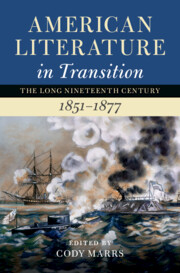Book contents
- American Literature in Transition, 1851–1877
- Nineteenth-Century American Literature in Transition
- American Literature in Transition, 1851–1877
- Copyright page
- Contents
- Figures
- Contributors
- Series Preface
- Introduction
- Part I Careers
- Part II Networks
- Part III Exchanges
- Chapter 13 Literature and/as Philosophy
- Chapter 14 Literature and/as Science
- Chapter 15 Literature and/as Ecology
- Chapter 16 Literature and/as Economics
- Part IV The Long Civil War
- Index
Chapter 13 - Literature and/as Philosophy
from Part III - Exchanges
Published online by Cambridge University Press: 15 June 2022
- American Literature in Transition, 1851–1877
- Nineteenth-Century American Literature in Transition
- American Literature in Transition, 1851–1877
- Copyright page
- Contents
- Figures
- Contributors
- Series Preface
- Introduction
- Part I Careers
- Part II Networks
- Part III Exchanges
- Chapter 13 Literature and/as Philosophy
- Chapter 14 Literature and/as Science
- Chapter 15 Literature and/as Ecology
- Chapter 16 Literature and/as Economics
- Part IV The Long Civil War
- Index
Summary
“Amidst his gray philosophizing, Life breaks upon a man like a morning.” Melville, Pierre or the Ambiguities1 In the decades since Stanley Cavell’s provocation in Senses of Walden that nineteenth-century American philosophy is perhaps best found in the “metaphysical riot of its greatest literature,”2 critics have charted with renewed interest how writers such as Emerson, Thoreau, Poe, Melville, Dickinson, Douglass, and Whitman have responded to and challenged the philosophical tradition. They have explored how these writers anticipate philosophers such as Friedrich Nietzsche, William James, Martin Heidegger, and Gilles Deleuze, and how contemporary philosophers from Giorgio Agamben to Slavoj Žižek have used pallid Melville as a cipher for their own conceptual systems.3 At the same time, critics have articulated how nineteenth-century American writers offer unique philosophies; how their writings blur literature and philosophy, as well as science and psychology; and how they develop their own philosophies of democracy, race, and sexuality.4 For Elizabeth Duquette, recent philosophical investigations of American literature have highlighted the importance “of the practice and place of philosophy in nineteenth-century American literature” and inspired scholars to “reexamine assumptions about abstraction, and what we do when we read a literary text.”5 It is not only a question of recognizing that writers such as Dickinson or Poe, Melville or Douglass are themselves perspicuous readers of philosophy, or that they make philosophical interventions of their own. These writers also push us to rethink issues of representation, interpretation, expression, style, and form. Given the wealth of recent philosophical readings of American literature, then, one might even be tempted to consider the study of American literature and philosophy as an emergent subfield.
Keywords
- Type
- Chapter
- Information
- American Literature in Transition, 1851–1877 , pp. 207 - 229Publisher: Cambridge University PressPrint publication year: 2022

